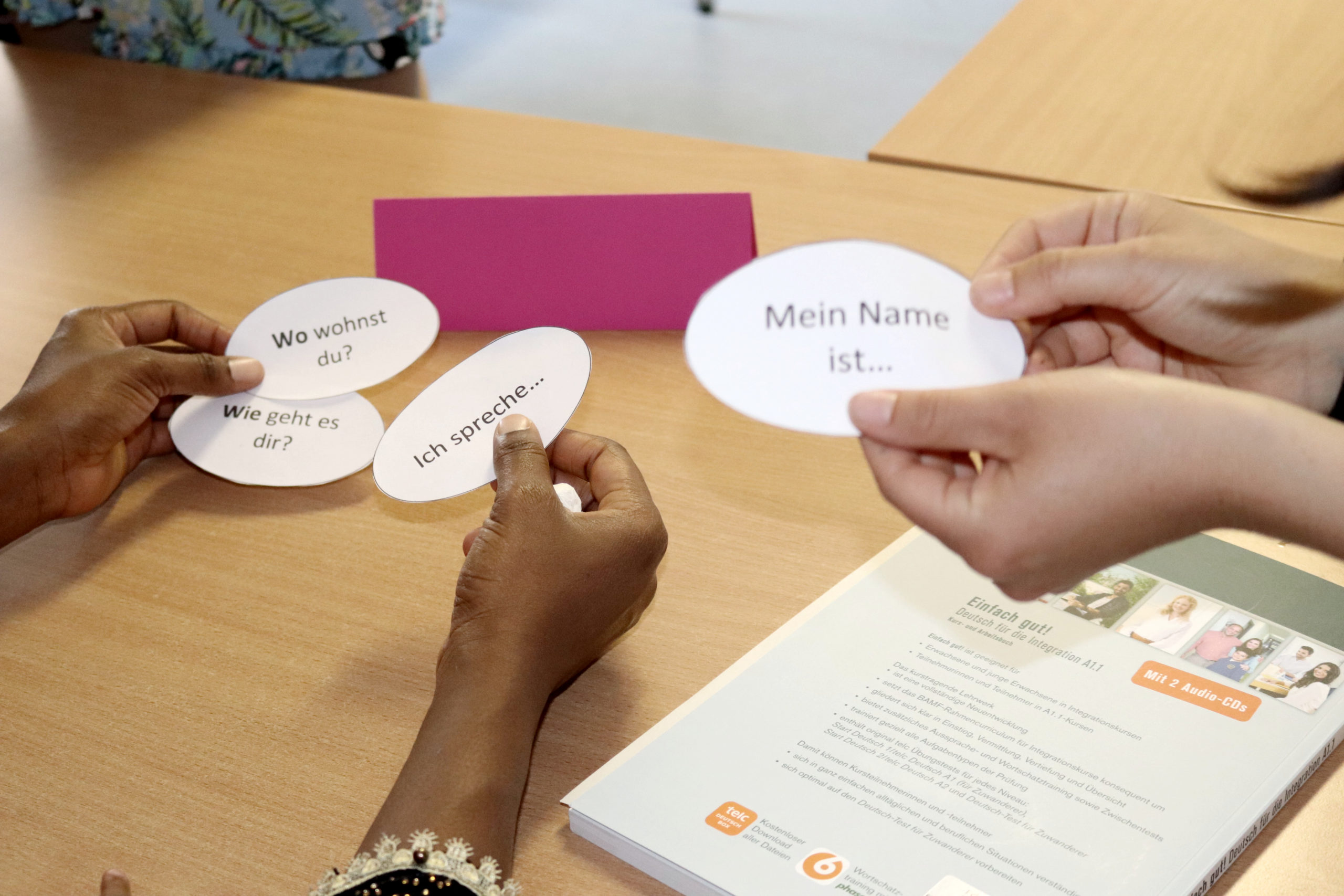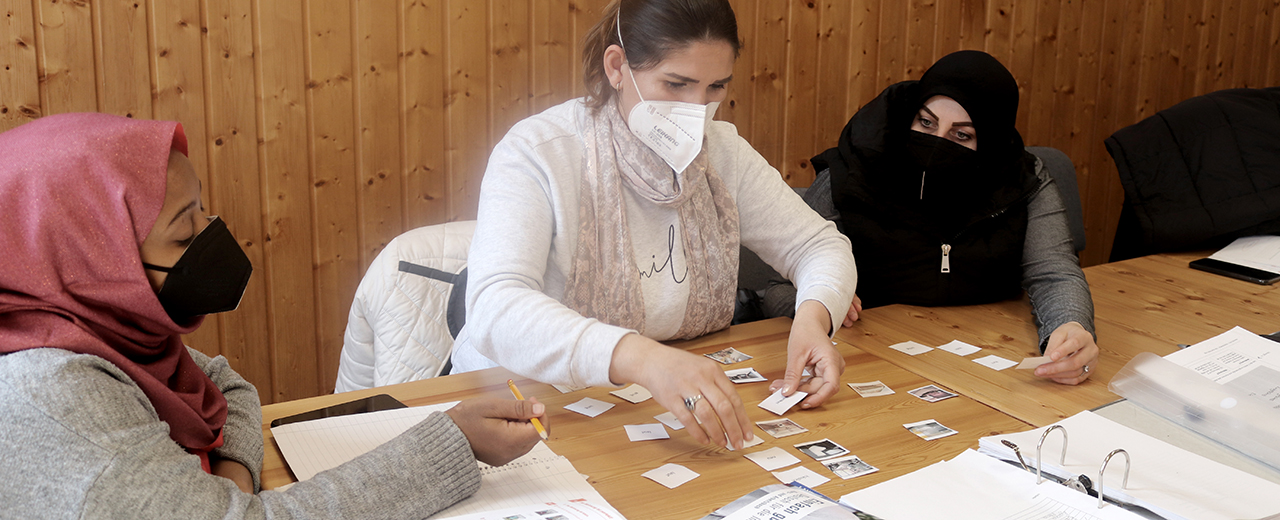 Language skills for a good start in everyday life
Language skills for a good start in everyday life
Jointly learning the new language and overcoming small hurdles
"Over here," Laila calls to Olga, who is just coming in. She has kept the seat next to her free, immediately they both start comparing their homework and helping each other with their exercises. 26-year-old Laila fled Afghanistan a few months ago with her husband and 3 sons, Olga, 10 years older, recently came alone from Ukraine with her two children. They got to know each other during the classes and became friends, even though the two women hardly speak German yet and come from two completely different worlds. While the mothers, who are so different, bend over their notebooks and learn the vocabulary and first sentences about shopping, their youngest children play in the childcare area next door. This gives the mothers a chance to learn, as kindergarten places are not yet available for the children. As part of the course, the women acquire the first basics of the language to cope with everyday life and also have the opportunity to ask questions and make connections.
Necessity
Language classes and counselling for refugee women with small children who otherwise cannot attend language courses
Activity
Language courses with accompanying childcare for refugee women, which are accompanied by individual learning and educational counselling
Countable effort
Number of refugee women with young children who have successfully attended a language course
Result
At least 40 refugee women significantly improve their German language skills and have access to individual educational counselling
Systemic effect
The social participation (language/education/employment) of refugee women increases and the integration opportunities for their children have improved
Background
The proportion of women among asylum seekers has risen continuously between 2015 (31%) and 2021 (41%) (Phineo Expertise “Fempowerment”, 2018; BAMF, 2022) and will increase significantly again in view of the influx of refugees from Ukraine in 2022. However, while in 2018 around 70% of men and 65% of women without children or with children aged 4 and over attended an integration language course, this was the case for only around 40% of women with small children (BAMF, 2020). As a result, the considerable time required to care for small children means that only 22% of the women in this group consider themselves to have (very) good German language skills (BAMF, 2020). Women with small children are often largely excluded from social participation or access to education and employment for years due to insufficient language skills. Statistically, the approximately 236,000 people with a so-called “Duldung” (toleration) in Germany remain largely ignored (Diakonie, 2021). These people have often been living in Germany for several years and a return to their countries of origin is uncertain. Nevertheless, access to official language courses is only available to them under very specific conditions. Furthermore, although the state system of integration courses has now been expanded to include course offerings with accompanying childcare, in reality these are not yet implemented enough due to organisational difficulties. As a result, the guided language acquisition (i.e. systematic / accompanied by lessons) is often delayed by years, especially for women with (small) children, which leads to a degree of “speaking incorrectly” at a low level. The aim of this project is to specifically promote the (linguistic) potential of refugee women with small children. As studies show, the improved integration of refugee mothers achieved in this way also has a significant effect on the later integration of their children (OECD, 2018).
The good deed
Your good deed today enables 5 minutes of German lessons for a refugee woman with a small child who would otherwise not be able to attend a language course. You make it possible for women with different backgrounds to learn German in small groups where they receive personal assistance. As part of a cooperation project with CampusAsyl e.V., students of "German as a Second Language" at the University of Regensburg teach in a team, led by a trained teacher, so that the (learning) needs of the participants can be addressed individually. Your support therefore creates double the benefit: Through better German language skills, the women can later more actively guide the educational progress of their children. On the other hand, the children learn about processes and structures in the accompanying childcare and experience their first (early) language development.

About Germany
Berlin
Capital
83,129,285
Number of inhabitants
50,801.8
Gross domestic product per capita per year
Rang 9 von 191
Human Development Index
In absolute numbers, Germany has the highest number of admitted and approved refugees in the European Union. The percentage of women among these refugees is steadily increasing
About the organization and further information
Association
CampusAsyl e.V.
Website

Further information and source
- de Paiva Lareiro C./Rother N./Siegert M., 2020. BAMF-Kurzanalyse 01/2020, Bundesamt für Migration und Flüchtlinge, Nürnberg.
- Liebig T., 2018. Dreifach benachteiligt?: Ein erster Überblick über die integration weiblicher Flüchtlinge, OECD Publishing, Paris.
- Brückner K./Spitzer S./Bräu J., 2019. Faktencheck Integration - Stadt und Landkreis Regensburg 2019, Landratsamt Regensburg, Regensburg.
- Ludwig S./Correard M., 2021. Wissen kompakt - Ausreisepflicht, Duldung und Bleiberecht, Diakonie Deutschland, Berlin.
- Albrecht K./Gugelfuß L., 2018. Geflüchtete Frauen in Deutschland stärken - Fempowerment, Phineo, Berlin.




